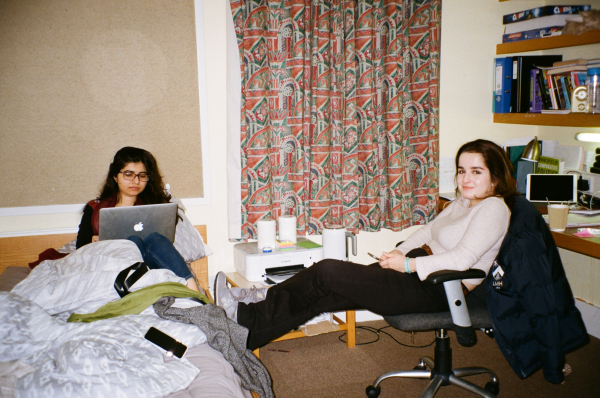For most of Gen-Z, the first introduction to activist-author-multihyphenate Malala Yousafzai was her book I Am Malala, released in October 2013. Written one year after the Taliban’s attempt on her life, the book became an international best-seller and earned her a Nobel Prize, making her the youngest laureate and second Pakistani to receive the accolade. Eleven years later, the now 28-year-old activist and author is a week shy of releasing her newest book, Finding My Way. Yousafzai talked to The Beacon about some of the themes her book will tackle, including mental health, college, and the bong rip that changed her life.
Thrust into the global spotlight at a young age, Yousafzai described being reduced to a “headline” or “photo op” because of her public perception as a hero, or even a “saint.”
“I have, of course, received recognition for my story and…have been defined as sort of a brave and courageous person when I was just 15 years old and still in a coma in a hospital,” she said. “So I wanted to tell more about myself beyond the headlines and the titles about my actual life journey.”
Her sophomore book is how she’s doing just that. In “Finding My Way,” she widens the scope of her story to include chronicles from her college days at Oxford University, her love life, and the first time she got ghosted by a crush.
“There are these personal experiences that I think people will enjoy, but also find helpful,” she said.
Reflecting on her college friends whom she relied on—especially when addressing her mental health for the first time since the attack—she expressed gratitude for friends who showed up for her in ways both big and small. Some suggested therapy, and others joined her for sleepovers to help her find peace at night in the midst of experiencing intense panic attacks and traumatic flashbacks. Yousafzai recalled realizing that, in college, making real friends whom you can rely on and create memories with is just as important as earning grades.

“I remember sitting in the library, opening all the textbooks I had to read, but looking down the window and watching my friends giggle and chat,” said Yousafzai. “I realized that I can come back to study anytime in my life, but these moments that I have with friends are going to stay with me forever.”
Balancing studying and socializing is hard enough for any college student, but especially for Yousafzai, who also had to juggle flying all over the world for advocacy trips. Sometimes she would fly to three different countries in one week, as well as having the world’s eyes on her as a rising global icon.
“I had a lot of pressure…I was really behind on my assignments,” she said. “Then I nearly failed my first year exams. I was in the bottom ranking.”
After her tutor wrote a letter to her parents and work team emphasizing the importance of her attendance and devoting time to her studies, she focused more on being a full-time student. However, before being able to refocus her sights on her academics, she first had to admit she needed help from campus resources like peer tutoring.
“In the end, I realized that I cannot just expect myself to figure it all out on my own,” said Yousafzai. “It was life-changing because I was like, I wish I had not hesitated in considering it.”
She continued, “you feel like you’re the only one, and you feel you have this imposter syndrome. But if the support is there, it means a lot more students are actually needing it for different reasons.”
This was also the case for her pursuit of mental health guidance. Yousafzai spoke about the societal barriers that prevent young people from admitting they need support, especially in her native Pakistan. She recounted being offered a therapist while recovering from the attack, but found the effort to ultimately be futile.
“I had one session where she asked me how I was feeling. I rolled my eyes and said, ‘this is not going to help me at all,’” she said with a chuckle.
It wasn’t until she experienced a jarring panic attack after smoking weed from her friend’s bong during her sophomore year that she reconsidered therapy. In an excerpt from her book, published in The Guardian on Sunday, she described lying awake at night for hours, shaking, and reliving the shooting that almost claimed her life.
“It went on for months. I thought nobody could understand what I was going through,” said Yousafzai. “Then, eventually, one of my friends recommended that I see a therapist, and that’s when I started receiving therapy.”
This time, however, the endeavor was fruitful—and she credits her friends for helping her get past her skepticism and accept she needed help from a professional, saying their support made “a huge difference.”
“With friends, I felt like I was not alone, and things were going to be okay,” she said.
Yousafzai’s hope is that her frank retelling of her mental health journey will break the stigma and encourage others to ask for help when they need it, too.
She said that, in a way, the process of writing this book was “a therapy in itself.”
“I wish I had heard or connected with a story that made me feel comfortable around the unexpected [mental health] experiences that I went through,” she said. “If this book can be of any help to anybody out there, I would say this book is a successful project, even if it can help one person.”
Finding My Way will be available everywhere on Oct. 21, with physical copies sold on Amazon, at Target, and e-books on Apple Books and Spotify. Yousafzai will also embark on a book tour, including a stop at Boston’s Shubert Theater next week, with a date to be announced. For more information, visit malalabook.com.